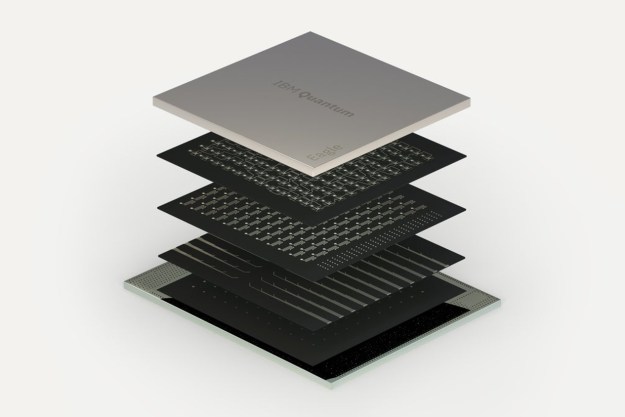
Google’s Quantum artificial intelligence lab recently revealed a new quantum processor that may pave the way for quantum computing to go mainstream. The new chip features 72 qubits according to Google and offers a compelling proof-of-concept for future, large-scale quantum computers.
“Our strategy is to explore near-term applications using systems that are forward compatible to a large-scale universal error-corrected quantum computer,” Google’s announcement reads.
All right, quantum computing is complicated, bizarre, and tough to explain but Google’s new Bristlecone chip is important for a few reasons. First of which, it’s designed to address one of the key problems facing quantum computing today: Error correction. Because traditional chips, like the one in your phone or your computer, or any other electronic device, all use Boolean logic — simple yes or no, on or off operations — error correction is fairly easy to implement. All of these traditional processors use redundancy to check for errors. Just copy a single bit of data three times, if one changes due to an error, your processor can just check the other two bits and make the correction.

That is an oversimplification but that is essentially how error correction works on regular processors. Now quantum processors use a different kind of logic which makes traditional error correction tricky. Instead of each bit having two potential states — on or off — a quantum bit or qubit has three. It can be on, off, or both, and you’ll only know which one it is once you look at it. This makes error-correction a huge problem for quantum computers. How can you tell if a bit of data is correct if looking at it might change its state?
“We chose a device of this size to be able to demonstrate quantum supremacy in the future, investigate first and second order error-correction using the surface code, and to facilitate quantum algorithm development on actual hardware,” Google’s announcement said.
Chips like Bristlecone aim to solve that problem by offering a testbed for quantum error correction on a chip with enough qubits to potentially achieve quantum supremacy — that is just a term for the first time a quantum computer can actually outperform a traditional supercomputer on a well-known computer science problem. According to Google, this new chip could be the one that does it — or at least some future version of Bristlecone.
Editors' Recommendations
- You can use the power of ChatGPT in Google Slides now
- Why Google Chrome Incognito Mode isn’t what it claims to be
- Google Docs update brings a productivity powerhouse feature
- Scientists just achieved a breakthrough in quantum computing
- Google’s new website wants to make your job interviews easy


